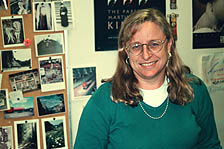
February 19, 2001
Dana Frank to hold prestigious post at University of Oregon
By Jennifer McNulty
Dana Frank, professor of American studies, will spend spring quarter at the University
of Oregon in Eugene as the holder of the prestigious Wayne Morse Chair for Law and
Politics.
 |
| Dana Frank, professor of American studies, has been selected to hold the Wayne Morse Chair for Law and Politics, named for the late U.S. senator from Oregon. Photo: Jennifer McNulty |
Frank, a prominent labor scholar and the author of Buy American, specializes in labor history, gender, and the global economy. During her Oregon visit, Frank will teach a class called Race, Social Justice, and U.S. Labor History, 1930-2000, give a public lecture, and participate in several symposia. Her lecture on April 10 is titled, "Working People and the Challenge of Globalization." Frank's appointment is part of the Morse Chair's two-year focus on issues of labor, race, and economic justice.
By holding the Wayne Morse Chair, Frank joins the ranks of scholar Frances Fox Piven, feminist author Barbara Ehrenreich, former U.S. senator George McGovern, and syndicated columnist Anthony Lewis. Also appointed to the Wayne Morse Chair is William B. Gould IV, a Stanford Law School professor and former chair of the National Labor Relations Board, who will visit the Oregon campus February 28-March 2.
Frank, who describes her work as a "reframing of trade policy in terms ordinary people can relate to," is looking forward to the opportunity to share her work with the public.
"This is a great opportunity to reach out to the public and interface with the labor movement," said Frank, whose critique of "Buy American" campaigns has attracted broad interest.
"It's important for people to understand how nationalism and the 'Buy American' attitude blinds people to the extent to which the corporations have gone global and the racial politics of that, which often takes the form of Asian bashing," she said. "We have to see working people in other countries as our allies, not our enemy. The corporations don't have a loyalty to the people of any particular country."
Closer to home, Frank will also give a public lecture in San Francisco on February 23. Her talk, "U.S. Labor and the Global Economy in the 20th Century," is sponsored by the Labor Archives and Research Center (LARC) at San Francisco State University. Frank has been named the LARC 2001 Distinguished Labor History Lecturer. Her talk begins at 7 p.m. in the Ship Clerks Association office of the International Longshore & Warehouse Union, Local 34, at 2nd Street and King on the Embarcadero in San Francisco. For more information, call (415) 564-4010.
Frank, whose first book was Purchasing Power: Consumer Organizing, Gender, and the Seattle Labor Movement, 1919-1929, combines the history of the labor movement and trade policy in her current work. Responding to transnational trade and globalization, unions worldwide are "groping toward international solidarity and establishing international labor standards," said Frank.
"We need to start talking about using politics to constrain corporate behavior," she added. Her forthcoming book, coauthored with Howard Zinn and Robin D. G. Kelley, is called "Three Strikes." In it, Frank and her coauthors each tell the story of a major U.S. labor action during the 20th century. Frank chose the 1937 Detroit Woolworth strike by women clerks and waitresses, hoping to reach today's audience of young people interested in direct action, consumer awareness, and chain stores' responsibility for the conditions in which their products are made.
"Students are deeply concerned about sweatshop labor," said Frank. "I try to get them to look closer to home, as well, and at their own jobs."